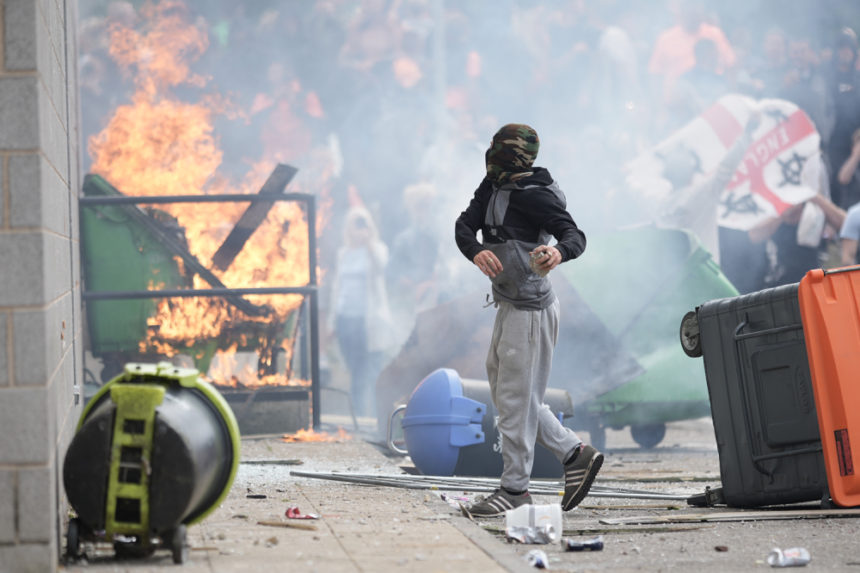Summary by Geopolist | Istanbul Center for Geopolitics:
The article from Foreign Policy explores the role of far-right elites in fueling recent race riots in Britain.
Key Points:
- Overview of the Riots: The article discusses a series of recent race riots in Britain, highlighting the violent clashes and social unrest that have erupted. These riots have raised concerns about rising racial tensions and the stability of communities.
- Far-Right Influence: The piece examines how far-right elites have contributed to the unrest. It suggests that these groups have actively stoked racial discord through provocative rhetoric and propaganda. The far-right’s attempts to amplify divisions and spread extremist views are seen as key factors in exacerbating the violence.
- Political and Social Context: The article places the riots within the broader context of Britain’s political and social climate. It notes that economic hardships, social inequalities, and increasing xenophobia have created a fertile ground for far-right ideologies to gain traction.
- Role of Social Media: Social media platforms are highlighted as a significant tool used by far-right groups to disseminate their messages and mobilize supporters. The article points out that the rapid spread of inflammatory content online has played a role in inciting and escalating the riots.
- Government and Law Enforcement Response: The response from British authorities is analyzed, including the measures taken to address the violence and curb the influence of far-right groups. The effectiveness of these responses and the challenges faced by law enforcement in managing the unrest are discussed.
- Long-Term Implications: The article reflects on the potential long-term consequences of the riots for British society. It considers the impact on community relations, political stability, and the broader fight against extremism.
Overall, the article provides a detailed examination of how far-right elites have contributed to the recent race riots in Britain, emphasizing the interplay between extremist ideologies, social media, and political dynamics.
Read more below.
A Far-Right Elite Stirred Britain’s Race Riots
“The muddy depths are being stirred by new monsters and witches from the deep,” Gore Vidal once wrote of the resurgence of the far right in the United States. In the case of the rioting that has erupted across England and Northern Ireland this week and last, old hatreds have been stirred up using new technologies.
The initial spark for the violence that has plagued British towns and cities was the sickening murder of three young girls last Monday in the seaside town of Southport, stabbed at a Taylor Swift-themed dance and yoga session. It was the sort of horrific crime that is mercifully rare in Britain. The last comparable attack on children occurred almost 30 years ago.
The only suspect in the Southport murders, 17-year-old Axel Rudakubana, was immediately arrested. We know Rudakubana’s name only because the judge in his case lifted an anonymity order—imposed as standard when the accused is a minor until legal proceedings begin—because false claims about the suspect’s origins were helping to fuel the racist violence. Social media posts claiming that the attacker was a Muslim, a refugee, a migrant, or a foreigner received 27 million impressions on Twitter/X in the 24 hours after the Southport killings.
Far-right groups descended on Southport the day after the stabbings. We know little about Rudakubana, but on Aug. 1 we did learn that he is a British national who was born in Cardiff to parents from Rwanda, a country with a large Christian majority. This has not prevented far-right thugs from rampaging through towns and cities including Manchester, Liverpool, Sunderland, Rotherham, Tamworth, Hartlepool, Middlesbrough, Aldershot, and Belfast, targeting Muslims
Many on the right have rushed to attribute the mobs to a sense of disillusion and a supposed social gap between the working class and the “elite”—a group in which they are never keen to count themselves. A few left-wingers have shared similar opinions. It is true that material factors have created a propitious environment in Britain for unrest. After 14 years of Tory government, before the recent Labour victory, the country is a poorer and more resentful place, its sclerotic and creaking public infrastructure barely functioning after years of neglect.
There is much to be angry about. Yet this does not adequately explain the nature nor the scale of the violence, much of which has been driven by a bourgeoning alliance between a right-wing elite and the mob—an alliance that, as Hannah Arendt once put it, rests on the “genuine delight with which the former [watch] the latter destroy respectability.”
For its part, the mob has attacked mosques, set buildings on fire, looted shops, violently assaulted ethnic minority bystanders, attacked cars on residential streets, and thrown bricks at the police. “We want our country back,” they yelled over the weekend while attempting to set fire to a hotel in Rotherham because they believed it was housing asylum-seekers. “P**i Muslims off our streets,” they yelled in Leeds. Footage from elsewhere showed men adorned with swastika tattoos, arms thrown up in Nazi salutes, voices yelling at anybody with brown skin to “go home.” This is not a rage that can, or should, be appeased.
This is not the first time rioting in the U.K. has been driven by bigotry. In Notting Hill in 1958, a mob of 400 white people attacked West Indian residents and their property. In the same week, racially motivated riots also broke out in St. Ann’s in Nottingham. Going further back, the Gordon Riots of 1780 saw an eruption of violent anti-Catholic sentiment.
Despite the atavistic nature of the hatreds unleashed this week and last, many who have taken to the streets this time around are creatures of social media. Several prominent far-right influencers have come out on social media in support of the mayhem with all sails unfurled. Others have been whipped into a near-homicidal frenzy by misinformation on apps such as X.
The kudzu spread of incendiary falsehoods began with the lie, first promulgated on X by the managing director of a clothing company, that the suspect in the Southport murders was an asylum-seeker named “Ali Al-Shakati.” The misogynist influencer Andrew Tate shared the false claim while asserting that the attacker was an “illegal immigrant.” The far-right activist Stephen Yaxley-Lennon, better known as “Tommy Robinson,” has used X to call for “mass deportations” and described Islam as a “mental health issue.” Meanwhile, disgraced actor Laurence Fox reacted to the stabbings by calling for Islam to be “removed from Britain.”
The mob responded accordingly. The day after false rumors about Ali Al-Shakati had began swirling around on social media, a group of white men attacked a mosque in Southport. The street violence has continued ever since.
Lurking in the background while disinformation is spread is a wealthy right-wing elite that has started to flex its political muscles. Some of the worst purveyors of misinformation have accounts on X only because right-wing billionaire Elon Musk has reinstated them—together with numerous other white supremacist accounts—under the guise of “free speech.”
Musk has spread misinformation about the riots on the app, claiming in one post that “civil war is inevitable” in Britain and amplifying one of Robinson’s posts. Robinson was reinstated by Musk in 2023 and today has more than 800,000 followers. Similarly, though he was banned from X in 2017 for claiming that women should bear “some responsibility” for being sexually harassed and assaulted, Tate was reinstated by Musk in 2022.
The takeover of media platforms by wealthy elites is driven by a right-wing adoption of the Gramscian belief that the conquest of power comes only after the conquest of culture. Musk, the world’s richest man, purchased X for $44 billion in 2022 in order to combat what he calls the “woke mind virus.” Together with renaming the platform, one of Musk’s first actions was to do away with legacy blue checks and open up verification on the platform to anybody with $8.
The move thrilled Musk’s sycophantic fan base, which had previously chafed with resentment at the status differential on the app between themselves and what they contemptuously referred to as the “legacy media.” But it also turned X into the world’s largest vector of misinformation. It is also of a piece with former White House strategist Steve Bannon’s idea of “flooding the zone with shit”—i.e., destroying the traditional media’s ability to give the public accurate information by letting it sink in a deluge of bullshit.
It isn’t only social media where influential right-wing figures have been allowed to blur the distinction between legitimate protest and far-right violence. Ever since the riots began last week, the British television station GB News has often sought to excuse them. Launched in 2021 and co-owned by the multimillionaire hedge fund manager Paul Marshall, since the murders in Southport, GB News has given airtime to an assortment of cranks, demagogues, and grifters. On more than one occasion, the station’s language has come dangerously close to incitement. The leader of the Reform U.K. party, Nigel Farage, who has his own show on GB News, also took to X in the aftermath of the Southport attacks to ask whether “the truth is being withheld from us” by the police about the identity of the suspect.
Earlier this year, Marshall—who as well as owning the reactionary website UnHerd is believed to be trying to purchase the Spectator and the Telegraph—was caught liking and sharing content close to the material that has been circulated this week by paranoid fascist weirdos. In February, the anti-extremist charity Hope not Hate revealed that Marshall had endorsed tweets calling for mass deportations and which suggested a civil war between “native Europeans” and “fake refugee invaders” was imminent.
Many of the presenters and guests on GB News have spent this week mocking Prime Minister Keir Starmer for labeling the riots as far right. Instead, the channel has sought to portray the street violence as driven by the “legitimate concerns” of disenfranchised members of the working class. The idea that the thuggish behavior of recent days is somehow representative of the working class is itself a form of middle-class prejudice—rooted in the unspoken assumption that working-class people are inherently stupid, racist, and violent.
GB News operates on familiar right-wing populist lines. Its prolier-than-thou presenters make superficial overtures to the masses while its modus operandi is to ensure that power is never truly shared or redistributed. But let’s not be too partisan about it: GB News is pushing at a door that has already been loosened by more “respectable” media coverage of migrants and asylum-seekers.
There is a self-pitying refrain on the right that you “can’t talk about” immigration. Yet the big mouths and shock jocks of the right-wing media seldom shut up about it. This time last year, the broadcaster James Whale suggested on Rupert Murdoch’s TalkTV that the U.K. “should point weapons” at migrants in the English Channel. Even talking about migrants in this sort of bloodthirsty language is no impediment to getting on. A few months later, Whale was made an MBE.
The suggestion that the violent protests represent the last resort of Britain’s forgotten majority is, of course, laughable. When polled, nearly 50 percent of Britons wanted harsher-than-usual sentences for the rioters, 39 percent the usual norms of sentencing, and just 4 percent more lenient charges.
Less than five weeks ago, Starmer convincingly won a general election against a Tory party that campaigned on the slogan of stopping the boats carrying asylum-seekers to the United Kingdom. In truth, the ghouls who have haunted television studios this week making excuses for the rioters see any Labour government as equivalent to an occupying power. They want their country back because, after 14 years, they feel as if it has been lost at the ballot box.
But if anybody has a right to think of themselves as the voice of the people at the present time, it is the newly elected Labour prime minister. He may not own a television station or a social media app, but he does have a 174-seat majority in the House of Commons. The rule of law—and democracy—must prevail.
By James Bloodworth
Source: Foreign Policy







